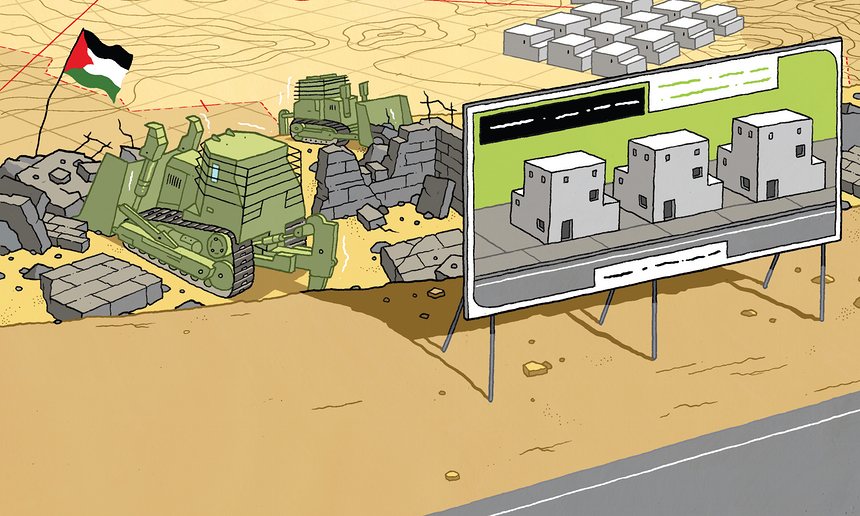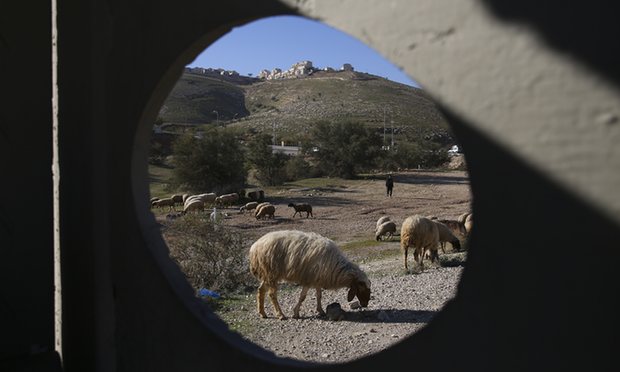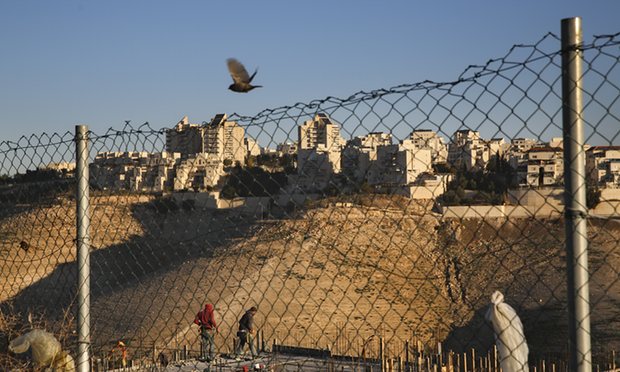It’s Too Late to Stop the Senseless Capture of Palestinian Land
PALESTINE ISRAEL GAZA GENOCIDE, 20 Feb 2017
Spineless world leaders have failed to implement international law, stopping the expansion of Israeli settlements.
13 Feb 2017 – Buttoned up against a biting wind, Khalil Tufakji, a 65-year-old Palestinian cartographer, points down from the Mount of Olives in the east of Jerusalem towards a huge wasteland – the last remaining space in the ring of Jewish settlements that surround the city.
This 35 sq km plot of West Bank land was confiscated several years ago and the settlement of Maale Adumim, now home to 40,000 people, was built on the south-eastern corner. But most of the plot still remains empty.
With Donald Trump now in the White House, Tufakji fears that Israel’s prime minister, Benjamin Netanyahu, will seize his chance to announce another expansion of settlements; bulldozers are ready, pink-roofed homes will be up in no time, and busloads of new immigrants – many arriving nowadays from war-torn Ukraine – will be whisked through settler roads and tunnels so fast they won’t see the Arab villages that lay claim to the land. They won’t even know they’re in a settlement. By the time they close their front doors, the whole area will have been annexed to Jerusalem, thereby not only cutting the city off from a hoped-for Palestinian state, but slicing the West Bank in two.
Some say the expansion can still be halted. United Nations resolution 2334, passed in December after Barack Obama’s change of heart, condemned settlements. But Tufakji lists countless UN resolutions passed only to be followed by settlement expansion. Today there are 630,000 settlers in Arab East Jerusalem and the West Bank, both illegally occupied since 1967. In East Jerusalem, 87% of the land is now under Israeli control “which leaves 13% for the Palestinians in East Jerusalem, down from 100% in 1967. Soon there’ll be none,” says Tufakji.
I’ve been listening to Tufakji since the mid-1990s and everything he foresaw has so far come true. He pointed out where a tunnel would be drilled through the Mount of Olives to connect settlements – it seemed impossible but we are now driving through it. He can read the future of this conflict because he reads the land and everything about this conflict concerns the land.
Poring over maps, he identifies the next land seizure by locating an aquifer; he can see where a settler road will divide an Arab village from its olive groves. He also deciphers Israel’s complex legal code that is used to authorise seizures under Ottoman or mandate law, or under the law of “absentee property”, and, following a vote earlier this month, now “legalising” the theft of Palestinian private land. Yet all settlement on occupied land is illegal under international law.
Tufakji has tried and failed to get the international community to see that the conflict is all about the land. Now, he says, it’s too late. Looking further into the future, he describes Israel’s master plan for 2050 and his tone switches from despair to fear. The 2050 plan envisages a huge new airport beyond Maale Adumim on land occupied by Nebi Musa, an ancient Muslim holy site dedicated to Moses. The airport will bring hundreds of thousands of tourists and pilgrims to Jerusalem, who will stay in huge new hotel complexes connected by rail to Amman and Iraq to the east and Tel Aviv to the west. The sheer scale of the scheme is breathtaking.
I first met Tufakji in 1993 in Orient House, which after the signing of the Oslo accords became the Palestinian political centre in East Jerusalem. For a while Orient House buzzed, as did the Arab streets nearby, as foreign delegations rolled up, often looking at Tufakji’s maps before mulling over the shape of the new Palestinian state.
Tufakji knew the Oslo deal was flawed, mostly because it did not stipulate a block on new building while the talks were under way but also because the rights of millions of Palestinian refugees, first made homeless in 1948 when Israel was created, were barely addressed. A man of compromise – his father was a policeman under the British mandate – he advised the foreign peace brokers that Oslo could work if all ongoing settlement on lands seized in 1967 was stopped forthwith, so at least a state within 67 borders might be contiguous, with East Jerusalem as its capital, and safe passages joining it to the Gaza Strip.
Yet the building was never stopped. Too ready to buy into Israel’s claim that some settlements were still needed for its own security, the international peace brokers, led by America and backed up by Europe, showed fatal weakness and squandered the chance to bring about peace.
A refusal to understand the Palestinians’ own deep attachment to the land and the lasting pain of their first 1948 dispossession was viewed as betrayal, a charge most viscerally levelled at the British, who, as authors of the 1917 Balfour declaration, had promised Palestine as a Jewish homeland.
As the deal collapsed, extremists on both sides gained ground with Hamas sending its suicide bombers into Jerusalem, causing a bloodbath. Hawkish Ariel Sharon responded by taking more Palestinian land while killing off the chance for Palestinian politicians to organise, as Jerusalemites became severed by checkpoints from the outside leadership based in the West Bank town of Ramallah.
A huge barrier wall, looping round Jewish areas, was built ostensibly to keep out suicide bombers, but was in fact another land grab, and holds 50,000 Palestinians on the Israeli side. The wall has extinguished social and commercial life in East Jerusalem, stunting freedom of movement, and dividing families who find themselves on different sides.
As we drive on around the city, passing through the impoverished Palestinian suburb of Silwan, Tufakji points out the numerous Star of David flags draped on walls of Arab houses. We reach the site of Trump’s proposed US embassy, which he has promised to move to Jerusalem, thereby endorsing Israel’s claim to the city as its united capital. Perhaps this is the move that could ignite the religious war so eagerly sought by fanatics down below.
Standing in Maale Adumim and looking back over the wasteland towards the Mount of Olives, Tufakji has no doubt that the land war is over – at least for now. The 2050 master plan – airport and all – will go ahead, he says. When I ask what next, he is no longer the voice of compromise. “Armed resistance,” he says. “A military uprising of some sort. There is now no other way.”
This uprising won’t happen for many years, he says. “The Palestinians are too weak now, the region too divided.” But when it comes it will be right here where Jewish settlements sit amid Arab neighbourhoods.
If Tufakji is again proved right, the blame for this future war will not lie with the descendants of the new Jewish arrivals from Donetzk or Lugansk, nor with the Palestinians whose land is being concreted over.
Blame will lie with the misguided hawks of Israel’s political right. But most of all it will rest with our own spineless world leaders who could have implemented international law and stopped the illegal building and the senseless capture of Palestinian land, when they had the chance.
_____________________________________
Sarah Helm is a former Brussels correspondent and diplomatic editor of The Independent. She is the author of If This Is a Woman, Inside Ravensbrück, and Hitler’s Concentration Camp for Women.
Go to Original – theguardian.com
Join the BDS-BOYCOTT, DIVESTMENT, SANCTIONS campaign to protest the Israeli barbaric siege of Gaza, illegal occupation of the Palestine nation’s territory, the apartheid wall, its inhuman and degrading treatment of the Palestinian people, and the more than 7,000 Palestinian men, women, elderly and children arbitrarily locked up in Israeli prisons.
DON’T BUY PRODUCTS WHOSE BARCODE STARTS WITH 729, which indicates that it is produced in Israel. DO YOUR PART! MAKE A DIFFERENCE!
7 2 9: BOYCOTT FOR JUSTICE!
DISCLAIMER: The statements, views and opinions expressed in pieces republished here are solely those of the authors and do not necessarily represent those of TMS. In accordance with title 17 U.S.C. section 107, this material is distributed without profit to those who have expressed a prior interest in receiving the included information for research and educational purposes. TMS has no affiliation whatsoever with the originator of this article nor is TMS endorsed or sponsored by the originator. “GO TO ORIGINAL” links are provided as a convenience to our readers and allow for verification of authenticity. However, as originating pages are often updated by their originating host sites, the versions posted may not match the versions our readers view when clicking the “GO TO ORIGINAL” links. This site contains copyrighted material the use of which has not always been specifically authorized by the copyright owner. We are making such material available in our efforts to advance understanding of environmental, political, human rights, economic, democracy, scientific, and social justice issues, etc. We believe this constitutes a ‘fair use’ of any such copyrighted material as provided for in section 107 of the US Copyright Law. In accordance with Title 17 U.S.C. Section 107, the material on this site is distributed without profit to those who have expressed a prior interest in receiving the included information for research and educational purposes. For more information go to: http://www.law.cornell.edu/uscode/17/107.shtml. If you wish to use copyrighted material from this site for purposes of your own that go beyond ‘fair use’, you must obtain permission from the copyright owner.
Read more
Click here to go to the current weekly digest or pick another article:
PALESTINE ISRAEL GAZA GENOCIDE:


